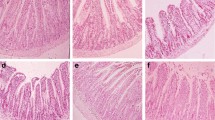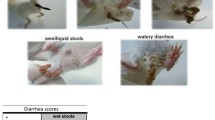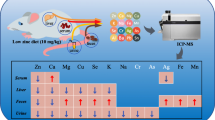Abstract
This study aimed to examine the reasons for the lack of growth in rats fed a zinc-deficient (ZnD) diet via gastric tube. Four days after rats were given free access to the ZnD diet (0.3 mg/kg Zn), their food intake had decreased, and their growth had stopped. Rats were then fed via gastric tube; growth was restored in rats fed a control diet (25 mg/kg Zn; restored group) but not in those fed the ZnD diet (ZnD group). In the ZnD group, there was no reduction in the apparent absorption of dry matter, protein, or ash during 3 days of tube feeding. Dry matter in urine was markedly higher on day 3 and mainly consisted of glucose. Urinary nitrogen was also elevated in the ZnD group, but nitrogen balance remained positive; i.e., bodily protein continued to increase during the 3 days of tube feeding. Drinking water consumption in the ZnD group was markedly reduced from the second day of tube feeding. On the other hand, urine volume in the ZnD group was comparable to that in the restored group. Water content in the bodies of the ZnD group was reduced. These observations demonstrate that the ZnD group was dehydrated. In conclusion, rats fed a ZnD diet via gastric tube did not grow because their drinking water consumption decreased with progression of zinc deficiency, thereby, decreasing bodily water content. Administration of water led to growth in the ZnD group.



Similar content being viewed by others
Abbreviations
- DP:
-
demineralized soy protein
- ZnD:
-
zinc deficient
- ALPase:
-
alkaline phosphatase
References
Chesteres JK, Quarterman J (1970) Effect of zinc deficiency on food intake and feeding patterns of rats. Br J Nutr 24:1061–1069
Norii T, Suzuki H (2004) Protein utilization in rats during early stages of zinc deficiency. Biomed Res Trace Elem 15:63–65
Flanagan PR (1984) A model to produce pure zinc deficiency in rats and its use to demonstrate that dietary phytate increases the excretion of endogenous zinc. J Nutr 114:493–502
Park JHY, Grandjean CJ, Antonson DL, Vanderhoof JA (1986) Effects of isolated zinc deficiency on the composition of skeletal muscle, liver and bone during growth in rats. J Nutr 116:610–617
Eder KE, Kirchgessner M (1994) Dietary fat influences the effect of zinc deficiency on liver lipids and fatty acids in rats force-fed equal quantities of diet. J Nutr 124:1917–1926
Norii T, Suzuki H (1990) Effect of dietary protein levels on tissue zinc content and serum alkaline phosphatase activity in zinc-deficient rats. J Jpn Soc Nutr Food Sci 43:247–253 (in Japanese)
Norii T, Suzuki H (2003) Influences of dietary protein levels and phytate contents on zinc requirement in rats. Int J Food Sci Nutr 53:317–323
Harper AE (1959) Amino acid balance and imbalance. I. Dietary level of protein and amino acid imbalance. J Nutr 68:405–418
Maehata E, Naka H (1972) The colorimetric determination of non esterified fatty acid (NEFA) with 2-(2-thiazolylazo)-p-cresol. Rinshoukagaku 1:447–456 (in Japanese)
Kind PRN, King EJ (1954) Estimation of plasma phosphatase by determination of hydrolyzed phenol with amino-antipyrine. J Clin Pathol 7:322–326
Lowry OH, Rosebrough NJ, Farr AL, Randall RJ (1951) Protein measurement with the folin phenol reagent. J Biol Chem 193:265–275
Dubois M, Gilles KA, Hamilton JK, Rebers PA, Smith F (1956) Colorimetric method for determination of sugars and related substances. Anal Chem 28:350–356
Park JHY, Grandjean, CJ, Vanderhoof JA (1989) Effects of pure zinc deficiency on glucose tolerance: Role of corticosterone. Nutr Res 9:183–193
Hooda A, Mehta U, Bhat CM (1984) Effect of different levels of dietary zinc and protein on nitrogen retention in rats. Nutr Rep Int 30:1183–1191
Hsu JM, Anthony WL (1975) Effect of zinc deficiency on urinary excretion of nitrogenous compounds and liver amino acid-catabolizing enzymes in rats. J Nutr 105:26–31
Pallauf J, Kirchgessner M (1976) Zinc deficiency as affecting the digestibility and utilization of nutrients. Arch Tierern 26:457–473
Yang J, Cunnane SC (1994) Quantitative measurements of dietary and 1–14C linoleate metabolism in pregnant rats: specific influence of moderate zinc depletion independent of food intake. Can J Physiol Pharmacol 72:1180–1185
Park JHY, Grandjean CJ, Hart MH, Erdman SH, Pour P, Vanderhoof JA (1986) Effects of pure zinc deficiency on glucose tolerance and insulin and glucagon levels. Am J Physiol (Endocrinol Metab) 251:273–278
Roth HP, Kirchgessner M (1994) Influence of alimentary zinc deficiency on the concentration of growth hormone (GH), insulin like growth factor I (IGF-I) and insulin in the serum of force-fed rats. Horm Metab Res 26:404–408
Author information
Authors and Affiliations
Corresponding author
Rights and permissions
About this article
Cite this article
Norii, T. Growth of Zinc-Deficient Rats During Intra-Gastric Tube Feeding. Biol Trace Elem Res 122, 266–275 (2008). https://doi.org/10.1007/s12011-007-8073-8
Received:
Accepted:
Published:
Issue Date:
DOI: https://doi.org/10.1007/s12011-007-8073-8




